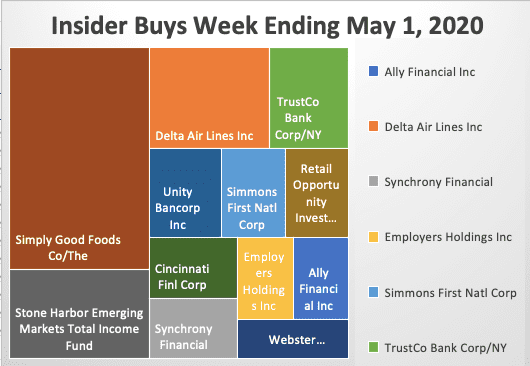
Our pick of the week, EDI Stone Harbor Emerging Market VP bought 100,837 at $5.88 yielding over 15%. Combined with the discount to NAV, the distribution rate for EDI as of May 1 was 27%. The Stone Harbor Emerging Markets Total Income Fund (EDI) is not for the faint of heart. It’s down 38%YTD and it’s five year return is -5.5%. It’s a managed portfolio of Emerging Markets Debt (sovereign and corporate debt in both hard and local currency) combined with an ability to invest in Emerging Markets Equity, structured to maximize total return.
The largest purchase last week was continued interest in Simply Good Foods. It’s not usually a good idea to NOT follow insiders but I have a hard time swallowing recycled Atkins bars in spite of Director Kilts massive and continued purchase of SMPL. This time, he added to his losing bet by buying $2.3 Million worth of at $16.67. I’d rather own Kellogg than Atkins . They both have insider buying but Kellogg has a fat dividend and Special K.
New Delta Airlines Director Jeanne Jackson bought 25,510 shares at $22.72. I wonder if she knew Warren Buffett was unloading all of his airlines stocks, including DAL.
ROIC Retail Opportunity Investments Director Zorn bought 29,112 shares at $9.22. ROIC is a regional shopping center REIT with mostly grocery stores and drug stores as anchor tenants. They recently suspended their dividend on a Covid-19 update where they announced rentals collected plunged to 67.5%.
Insiders generally buy stocks when they are depressed. They are the ultimate contrarian investor combined with inside knowledge. I expect they will be proven to be right again. An interesting alternative ETF would be the KRE, SPDR S&P Regional Banking ETF. Here are the following bank buys:
ALLY Ally Financial Director Clark bought 15,000 shares at $14.25.
SYF Synchrony Financial Director Aguirre bought 15,300 at $16.55
SNFC Simmons First National Corp Chairman Makris bought $272,621 worth at $17.04.
TRST TrustCo Bank Corp CB McCormick bought 65,000 shares at $5.91
WBS Webster Financial Corp Director Flynn bought 8000 shares at $26.25
CINF Ciicinnati Financial Corp, Director Skidmore bought 3500 shares of this property casual insurer at $72.51. CINF sank on 1st quarter earnings and a litany of analyst downgrades.. Book value went down $10.53 or 17.4% since yer end. The earnings drop was mostly driven on higher catastrophe losses. There is some uncertainty about the ultimate liability from business interruption insurance and Covid-19.
Insiders sell stock for many reasons, but they generally buy for just one – to make money. THE INSIDERS FUND invests in companies at or near prices that management has been willing to invest significant amounts of their own money in. After all, who knows a business better than the people running it? You’ve always heard the best information is inside information. This is as close to “insider information” that an ordinary investor is likely to see- and it’s entirely legal. Officers, directors, and 10% owners are required to inform the public through a Form 4 Filing any transaction, buy, sell, exercise, or any other with 48 hours of doing so. This info is available for free from the SEC’s Web site, Edgar, although we subscribe to SECForm4 as they provide a way to manage and make sense of the vast realms of data. I’ve tried a lot of vendors and SECForm4 is one of the most customer friendly and responsive I’ve used.
As a rule, we only look at material amounts of money, $200 thousand or more, as anything less could just be window dressing. The bar is different from selling because the natural state of management is to be sellers. This is because most companies provide significant amounts of management compensation packages as stock. Therefore, with selling, we analyze for unusual patterns, such as insiders selling 25 percent or more of their holdings or multiple insiders selling near 52-week lows. Another red flag is large planned sale programs that start without warning. Unfortunately, the public information disclosure requirements about these programs referred to as Rule 10b5-1 is horrendously poor. I also generally ignore 10 percent shareholders as they tend to be OPM (other people’s money) and perhaps not the smart money we are trying to read the tea leaves on.
Of course insiders can also be wrong about their Company’s prospects. They can easily be wrong about how much others will value them, and in many cases, maybe most cases have no more idea what the future may hold than you or I. In short, you can lose money following them. We have and we curse aloud, what were they thinking! Needless to say, past good fortune is no guarantee of future success. We may own positions, long or short, in any of these names and are under no obligation to disclose that. We welcome your comments on our analysis.
This blog is solely for educational purposes and the author’s own amusement. Investing with The Insiders Fund is for qualified investors and by Prospectus only. Nothing herein should be construed otherwise. To learn more about our strategy, visit our website. If you would like to hear more about how you can get involved with the Insiders Fund, please schedule some time on my calendar.
Prosperous Trading,
Harvey Sax

